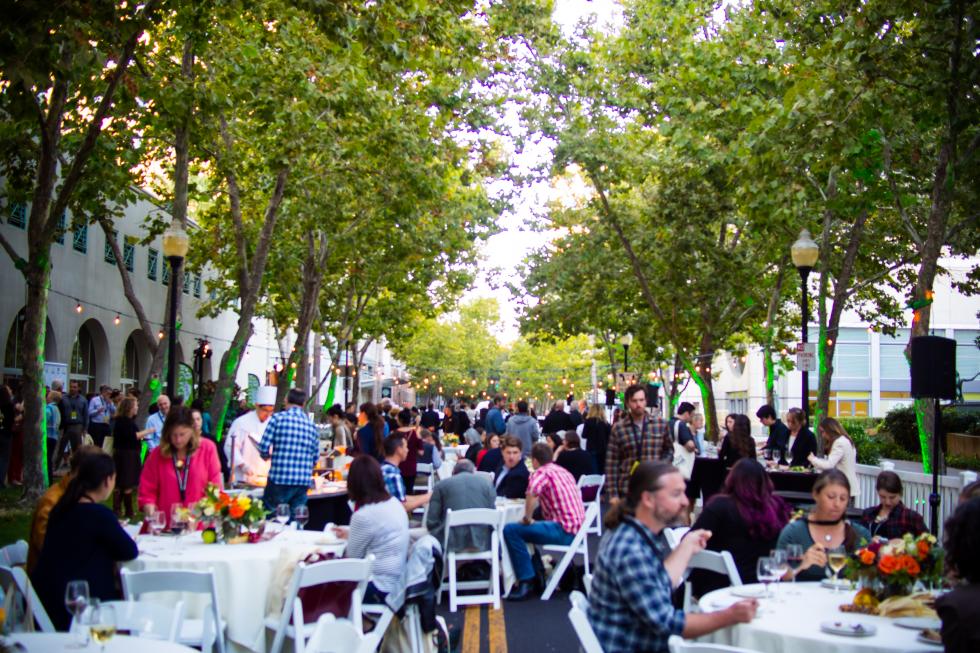When Sacramento declared itself the Farm-to-Fork Capital of America in 2012, it opened a floodgate of introspective conversations across the region. How do we truly lead in agriculture? Is this a story for every participant along the food chain? On Sept. 22 and 23, Visit Sacramento partnered with renowned nonprofit think tank Food Tank to bring leading food systems experts together around these questions for the inaugural Farm Tank conference.
The event drew speakers ranging from a Monsanto vice president to a senior director at the Humane Society in panel-style conversations that reached a live audience of 450, an online streaming audience of 1,100,409 through Facebook, and 1,484,941 viewers via Twitter and Instagram, according to Food Tank data.
“Agriculture begins here,” says Nicole Rogers, director of Visit Sacramento’s Farm-to-Fork program, during a post-conference interview. “So many conversations surrounding food and agriculture happen on the East Coast, but California is the largest agricultural producing state in the nation, and we were missing from the conversation. We needed to demonstrate how truly diverse the conversation is.”
The conference kicked off with keynote speaker Saru Jayaraman, co-director and co-founder of Restaurant Opportunities Centers (ROC) United, who addressed the hidden costs of the fastest-rising job sector in America: restaurants. Despite this sector’s economic rise, it has the lowest paying jobs in the country and that’s impacting a lot of people: One is every 10 private sector employees works in the sector, according to ROC United.
With one of the food system’s cracks laid bare, the conference proceeded to pull back the layers of a complicated structure. While Robert Egger, founder and president of L.A. Kitchen (a nonprofit that reclaims produce food waste and uses it to train the unemployed in culinary professions), rallied folks during his opening saying, “Some people say ‘food not bombs.’ I say food is a bomb. Let’s blow some sh** up,” it was a peaceful event. The Monsanto representative got booed a few times, and a panel conversation about proteins was interrupted briefly by a few young vegan attendees holding signs and chanting. Yet, overall, tough questions were asked and answered across aisles in a mostly civil dialog.
At the conclusion of Farm Tank’s first day, attendees enjoy a
farm-to-fork meal on 13th Street in Sacramento, prepared by the
culinary team at the Hyatt Regency. (Photo courtesy Lisa
Nottingham)

As Rogers later describes it, “We tore down barriers, made people a little uncomfortable and had some of the most frank discussions in the industry.” Activists and business leaders pointed out flaws, success and places for innovation in a complicated, imperfect food system.
Thaddeus Barsotti, co-owner of Farm Fresh to You called out a pressing need in his farming business: teaching children at an early age how to cook vegetables. The ultimate goal? Get kids to eat their vegetables — and buy them.
Sheila Bowman, Seafood Watch manager of culinary and strategic Initiatives at Monterey Bay Aquarium, asked attendees to pay attention to the seafood varieties they eat. “We would never drink wine without six or seven adjectives to describe it, but we take it at face value when we eat tuna.” In other words, consumers want to know where their wine comes from and how it was grown, yet they don’t ask enough questions about the way seafood was caught or from where it was harvested. The Monterey Bay Aquarium has become famous for its easy-to-use consumer guide on seafood species to eat or to avoid eating due to reasons including overfishing, endangerment, and making eco-friendly choices.
The Morning Star Company, the world’s largest processor of canned tomato products in the nation, called for more consumer engagement. “We respond to the market. If everybody in America wanted organic tomatoes, we would respond to that,” said Nick Kastle, director of marketing and business development. In an off-stage conversation, he told me that the Morning Star Company never uses GMO tomatoes for the same reason: consumers don’t want them.
Zachary Dashner, of the Barilla Center for Food and Nutrition alumni association and a student at UC Davis, spoke passionately about every mother’s favorite subject: lima beans. He’s developing varieties at UC Davis in hopes of inspiring everyone to eat this protein-packed bean. As one outcome of the conference, Dashner hopes to work with Monsanto on an upcoming UC Davis organic seed symposium. He would like students to tour Monsanto’s organic seed program. “Hopefully it will be a productive conversation,” Dashner says.
A speech from General Mills executive vice president of supply chain pointed to a growing awareness within industry of a greater responsibility to the larger food system. “We don’t own the entire value chain,” said John Church, “but we participate in the whole thing.”He concluded that when big food is done well, “the lever is that much longer,” and thus, the impact on the entire food system is greater.
Michael Dimock, president of the Oakland nonprofit Roots of Change, summarized the event. “There’s a contradiction between the cost of food and availability of food that hurts the food movement.” By this, he means that as the movement pushes for consumers to make food choices that are healthier for themselves and for the planet, it must simultaneously work to improve the system in which food is produced — because even healthy food can come at a cost to those who cannot afford it, farm workers and the environment.
The two-day conference concluded with bus tours highlighting the Capital Region’s agricultural successes in food hubs, farm-to-school programs, ecology in agriculture and more. Participants started their day eating school breakfast prepared by Natomas Unified School District, then visited farms, schools and ag facilities.
Many say the event succeeded in creating what Sacramento is uniquely positioned to provide: a space where colliding ideologies sat down at the same table in a first step toward improving U.S. food systems. We live in a region with the largest community supported agriculture, or CSA, program (Farm Fresh to You) down the road from conventional agri-mega-business Monsanto, and on those two days in late September, representatives of those two entities shared a stage and a conversation to inform millions of listeners.
After a successful first year, Visit Sacramento plans to hold the Farm Tank conference in Sacramento annually. “America’s Farm-to-Fork Capital is where we should be having these talks,” Rogers says, “and where real learning and real connecting happens.”



